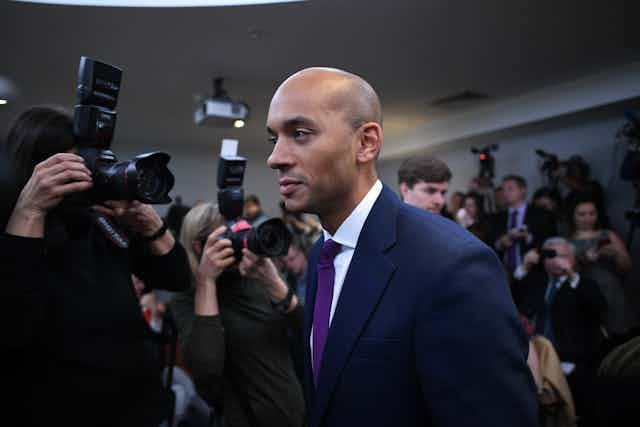The rumours of a breakaway centrist movement have finally come to fruition. Frustrated at Labour’s supine approach to Brexit, and understandably angered by the leadership’s attitude towards anti-Semitism within the party, seven MPs including Chuka Umunna and Luciana Berger have had enough. They have broken with their former allies and will now sit as an independent group in parliament.
Though the contemporary context lends matters a particular urgency, British politics has seen some dramatic political splits before. Back in the late 19th century, Joseph Chamberlain’s Liberal Unionists formed largely to prevent Home Rule for Ireland, albeit ending up being merged into the Conservative Party in 1912. Half a century after Chamberlain’s dramatic move, there were schisms in both Labour and Liberal forces as they wrestled with the dilemma of supporting the Conservative-dominated national government in the 1930s. The so-called National Liberals, again, ended up a virtual vassal of the Tory Party in the post-1945 period.
As such, the major difference between these and, one presumes, the new Labour split, is that the aforementioned cases all ended up intellectually and, later, formally, subsumed by the political right. Today, however, it is the left that needs some hard thinking. Here we may best look back to two historic examples.
The New Party
The first concerns the New Party of 1930-31. This was a short-lived vehicle for Oswald Mosley, whose later shift to fascism has seen it rather underplayed (Matthew Worley’s great work not withstanding) in the popular mindset. But what the New Party represented for many of its fellow travellers was a space to think away from the constraining forces of small “c” conservatism, embodied by orthodox figures like Ramsay Macdonald and Philip Snowden.
In a British climate then obsessed with the austere reduction of public spending, this new force offered politicians a means to forward their views on alternatives, such as a “borrow to invest” solution to the economic slump. Mosley’s resignation speech from the Labour government in May 1930 – in protest at its insufficiently dramatic attempts to curb rising unemployment – had been a Keynesian call to arms that it seemed many would follow.
Regardless of where its leader ultimately went, then, the New Party created a space for new ideas. Figures who probably would not have seriously conversed, including Tories like Harold Macmillan and later Labour heroes like Nye Bevan, were given a means through which they could plausibly, and creatively, think about the future.
Neither Macmillan nor Bevan ended up joining the New Party, which was crushed in the 1931 general election. But discussing the possibility of doing so helped garner associations that led to further cross-party talks through the 1930s. Aided by the unifying experience of the war against Hitler’s Germany, it helped create the intellectual thrust necessary for a post-war consensus towards a more interventionist state. Such figures returned to their traditional folds, but did not shed the radicalism their flirtation with the New Party had brought. There was a long-term impact here.
The SDP
The more famous example of the Social Democratic Party (SDP) arrived 50 years later. This was created in opposition to the nationalising, anti-EEC, and anti-nuclear weapons agenda of Michael Foot as Labour leader. The SDP was a project of serious intellectual heft, led by the “Gang of Four” of ex-Labour giants: Roy Jenkins, David Owen, Bill Rodgers and Shirley Williams. It was, crucially, also populated by many figures who would make the journey to New Labour in the 1990s.

For my forthcoming book, March of the Moderates – which looks at the rise of Bill Clinton’s New Democrats in the US, and New Labour in the UK – I had the good fortune to sit down with Roger Liddle, later Tony Blair’s special adviser on Europe. Liddle had been one of the founding members of the SDP, and in retrospect praises the grouping as providing “a very intellectually liberating experience and doing some interesting policy work”.
By creating a new organisation, not beholden to various special interests, progressive figures were able to pickle a dogma that helped produce the climate for 13 years of government after 1997. A total of 28 Labour MPs (and a single Tory) had joined the SDP determined to engage with an electorate that had become more individualised, and less trusting of the left’s ability to tax and spend effectively, than Labour wanted to admit.
The old left, the SDP contended, was “now pledged to policies which would isolate and weaken Britain – import controls, unilateral withdrawal from the EEC, one-sided disarmament”. Though acknowledging the trade offs of the special relationship with the US, they believed “Britain’s security as a country depends on the cohesion and effectiveness of the NATO alliance.”

Where Labour had talked itself into a series of positions it was difficult to quickly reverse out of (for all the good work of Neil Kinnock), creating a new party allowed the unthinkable not only to be thought, but articulated. The SDP could not quite break through – gaining a quarter of the vote in 1983 but, thanks to first past the post system, only 23 seats. But its intellectual legacy lived on. Put simply, the groundwork for New Labour’s pro-market, pro-defence and, fundamentally more electable strategy, was laid both within, and outside, the Labour party.
Occasionally, politics becomes gummed up. Sometimes tribalism blinds us to the good intentions (and indeed policies) that the people on the other side of the fence may have. Party machines can be captured to the point of no imminent return. And so what is to be done for those who disagree? Chris Leslie, Angela Smith and others have stepped outside the Labour box for answers – and, history suggests, they may have a point. The new independent force may not, and probably will not, change the political game overnight. But if British politics is to escape the current dirge, something must be done.

